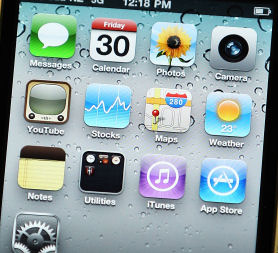iPhone ‘jailbreaking’ fuels app piracy
In a similar way to the illegal bootlegging of music and films, pirated mini-software for mobile phones is causing developers growing concern, finds Benjamin Cohen.

The music and film worlds have been trying to stop illegally made copies of film and music tracks being sold as bootlegs or given away as free internet downloads for years.
Now the pirates have tuned their attention to the expanding mobile phone industry. In particlar the mini software programme applications known as Apps which give you, among other things, the weather, music, games and news websites direct to your handset.
Apple, the company behind the hugely successful iPhone and iPad, has been targeted; pirates are now offering free versions of its Apps, leaving the App developers increasingly worried about their future and the future of the industry.
Tonight on Channel 4 News, Benjamin Cohen looks at the growing threat of mobile phone application piracy and examines how it’s starting to affect the lives of application or ‘app’ developers:
The iPhone, iPod Touch and iPad have popularised the concept of mobile apps and there are almost a quarter of a million available in the Apple App store. Some are free, but many cost anything ranging from 59p to hundreds of pounds.
Successful apps, such as FatBooth (which takes a photograph of a face and makes its fatter) have made their developers rich. Apple takes 30 per cent of the revenue from sales of apps and it’s one of the most profitable parts of its business.
To protect that revenue and, they say, to prevent viruses from finding their way onto your device, all iPhones, iPod Touches and iPads are locked so you can only download apps from its official App store. It also prevents viruses from infecting their devices.
There is a way around this, through “jailbreaking”, which effectively unlocks your device, allows you to download apps that Apple haven’t approved but, crucially, also download pirate applications. Some jailbreakers are clearly unlocking their phone for legitmate reasons, but I’ve spoken to many who have jailbroken their phone to illegally download.
There’s been considerable debate as to whether jailbreaking your iPhone is legal. The US Copyright Office (and subsequently the Library of Congress) has ruled that breaking Apple’s grip on their products is “fair use”. Apple does warn that jailbreaking your product can invalidate your warranty but that hasn’t stopped an estimated five million people from doing just that.
Now while piracy of apps does affect big corporations, TomTom’s £44.99 application being a favorite of app pirates, what’s so significant about this new type of piracy is the impact on very small companies or individual developers.
The beauty of Apple’s App Store is that app creators get a great distribution system and can reach the market much more easily that they possibly could before. I met Tak Fung, who sold over 150,000 copies of his first app MiniSquadron. Priced between 99p and 1.79, it’s been a big money maker. Last week, he launched a new game called Epic Win, but within minutes of it being on sale, Tak found pirate copies of the game all over the internet.
This is different to traditional piracy, which tends to affect big film, music or software companies. In this instance the iPhone pirates are stealing from people just like themselves. “I’m just this guy who is sitting in this bedroom and I made this game with no funding and I require these people’s support to survive,” Tak told me.
“It’s sometimes hard to blame them because they’re not educated to know it’s not a big corporation, a faceless company, it’s just me in my bedroom.”
Some 10 per cent of the 50 million iPhones, iPod Touches and iPads are believed to have been jailbroken. Last week, Apple updated their software to close the hole that allowed the JailBreakMe website to crack the lock on Apple devices with one simple click.
But as Apple’s update will only come into effect when users voluntarily update their operating system, the JailBreakMe system is still unlocking thousands of devices a day and there will no doubt soon be a hole found within Apple’s latest operating system.
It’s clear that piracy will grow on these devices and perhaps that developers need to update their business model to reflect this. You can, for instance, download The Sun’s iPad application illegally, but after 30 days of usage, you are forced to make an “in app” payment in order to continue to read the newspaper.
Without completely re-writing the application, it doesn’t appear possible for pirates to use that particular app in the long run. Games developers may charge credits to unlock particular levels or to add to the attributes of an avatar, while giving their application initially away for free.
-
Latest news
-
As India goes to the polls in the world’s largest election – what do British-Indians think?6m

-
Tees Valley: Meet the candidates in one of the biggest contests coming up in May’s local elections4m

-
Keir Starmer says public sector reform will be a struggle7m

-
Nicola Sturgeon’s husband Peter Murrell charged with embezzlement of funds from SNP1m

-
Ukraine might finally get $60billion in American weapons and assistance to defend against Russia3m

-




